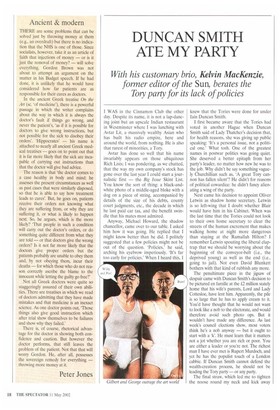Ancient & modern
THERE are some problems that can be solved just by throwing money at them (e.g., an overdraft) but there is no indication that the NHS is one of those. Since socialists, however, take it as an article of faith that injections of money — or is it just the removal of money? — will solve everything, Gordon Brown was not about to attempt an argument on the matter in his Budget speech. If he had done, it is unlikely that he would have considered how far patients are as responsible for their cures as doctors.
In the ancient Greek treatise On the Art (sc. 'of medicine'), there is a powerful passage in which the writer complains about the way in which it is always the doctor's fault if things go wrong, and never the patient's, 'as if it is possible for doctors to give wrong instructions, but not possible for the sick to disobey their orders'. 'Hippocrates' — his name is attached to nearly all ancient Greek medical treatises — goes on to point out that it is far more likely that the sick are incapable of carrying out instructions than that the doctor will give bad advice.
The reason is that 'the doctor comes to a case healthy in body and mind; he assesses the present circumstances as well as past cases that were similarly disposed, so that he is able to say how treatment leads to cures'. But, he goes on, patients receive their orders not knowing what they are suffering from, or why they are suffering it, or what is likely to happen next. So, he argues, which is the more likely? 'That people in such a condition will carry out the doctor's orders, or do something quite different from what they are told — or that doctors give the wrong orders? Is it not far more likely that the doctors give proper orders but the patients probably are unable to obey them and, by not obeying them, incur their deaths — for which those who do not reason correctly ascribe the blame to the innocent while letting the guilty go free?'
Not all Greek doctors were quite so staggeringly assured of their own abilities. There are treatises in which we read of doctors admitting that they have made mistakes and that medicine is an inexact science. As one doctor points out, 'Those things also give good instruction which after trial show themselves to be failures and show why they failed.'
There is, of course, rhetorical advantage for the doctor in showing both confidence and caution. But however the doctor performs, that still leaves the problem of the patient. Not that that will worry Gordon. He, after all, possesses the sovereign remedy for everything — throwing more money at it.
Peter Jones






































































 Previous page
Previous page